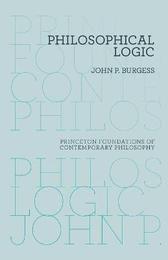
|
Philosophical Logic
Paperback / softback
Main Details
| Title |
Philosophical Logic
|
| Authors and Contributors |
By (author) John P. Burgess
|
| Series | Princeton Foundations of Contemporary Philosophy |
|---|
| Physical Properties |
| Format:Paperback / softback | | Pages:168 | | Dimensions(mm): Height 216,Width 140 |
|
| Category/Genre | Philosophy - logic |
|---|
| ISBN/Barcode |
9780691156330
|
| Classifications | Dewey:160 |
|---|
| Audience | | Tertiary Education (US: College) | | Professional & Vocational | |
|---|
|
Publishing Details |
| Publisher |
Princeton University Press
|
| Imprint |
Princeton University Press
|
| Publication Date |
26 August 2012 |
| Publication Country |
United States
|
Description
Philosophical Logic is a clear and concise critical survey of nonclassical logics of philosophical interest written by one of the world's leading authorities on the subject. After giving an overview of classical logic, John Burgess introduces five central branches of nonclassical logic (temporal, modal, conditional, relevantistic, and intuitionisti
Author Biography
John P. Burgess is professor of philosophy at Princeton University. His books include "Fixing Frege" and "Truth", which was cowritten with his son, Alexis G. Burgess.
Reviews"Burgess has managed to pack an amazing amount of good material into this short monograph, and it can be confidently recommended to any philosopher who wishes to go beyond an introductory logic course and venture into the wilds of philosophical logic. The technical details are of necessity sketchy, but the author provides the reader with helpful lists for further reading at the end of each chapter, as well as a good bibliography. This is an excellent little book, and deserves wide success."--Alasdair Urquhart, Notre Dame Philosophical Reviews "This book is interesting and useful. It enables readers to learn much in a short time... It could be valuable for philosophers working in metaphysics and the philosophy of language who are not logic specialists."--Stephen McLeod, Philosophy in Review "[A] good starting point for exploring philosophical questions about logic, importantly by pondering the reasons for Burgess' sympathies and antipathies."--Paloma Nrez-llzarbe, Mathematical Reviews
|